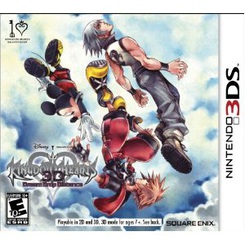Game Review
by Dave Riley,Kingdom Hearts: Dream Drop Distance
Nintendo 3DS
| Description: |  |
||
Sora and Riku enter the world of dreams as part of a quest to become Keyblade Masters in Dream Drop Distance, the latest entry in the Kingdom Hearts saga. |
|||
| Review: | |||
Kingdom Hearts is generally regarded as a “love it or hate it” series, but perhaps it's more accurate to say that Kingdom Hearts is so weird, and so funky, that it is exceptionally good at making itself difficult to love. There's just too much stuff. Every character is a clone, or a time traveler, or a tool of the forces of darkness, now reformed. Every piece of architecture is diagonal house, or a slanted tower, or made of mushrooms, or made of lasers, or made of the oblique angles of a futuristic techno-building floating in space. Every menu option is abrasively pink, or fuchsia, or yellow, or teal. In a way, this schizophrenic and slap-dash sense of design is what Kingdom Hearts is made for. It fits perfectly the ridiculous world where Tetsuya Nomura's predilection towards superfluously zippered costumes and boyish grins crashes headlong into the Disney cavalcade, whose composition here is a little weak. B-list Disney movies like The Hunchback of Notre Dame and Tron: Legacy (sans Jeff Bridges) make up the bulk of the game, with only a brief smattering of more interesting choices like Fantasia.
Thinking of Kingdom Hearts as simply “those games with the zippers and the Disney characters” is accurate, to a point. The series is famous for its meandering and inscrutable plot, but even by that metric Dream Drop Distance's narrative is exhausting and muddled. This time around Sora and Riku's primary goal amounts to a mid-season training montage, while in the background the promised all-out war threatening the Disney-verse approaches with the glacial precision of the nebulous “winter” in Game of Thrones. We are promised that, someday, the bad guys will attack the good guys in a manner that does not involve clones, or time travel, or different dimensions, or other such silliness. Today is not that day. Today Sora and Riku train to become “Keyblade Masters,” which, one thinks, is a title they should already possess de facto after spending ten years using the things. But writing off Kingdom Hearts based on its most absurd, most pandering elements ignores that this is one of the best Action RPGs in recent memory. Sora and Riku, both, have access to skads of teleporting slashes and spin attacks, distributed from a pre-configured, rotating “deck” of commands, and dealt out between dashes, and dodges. The “Flow Motion” system turns any wall or railing in the environment into a springboard for a pinkified area of effect explosion. By their side are the friendly Dream Eaters: Pokémon-style monsters who, when leveled up, bolster characters with passive abilities for extended combo chains and “last stand” revivals. Fans will probably be disappointed with the relative absence of standard party members Donald and Goofy, but the Dream Eaters and the “collect them all” mentality they inspire provide an adequate (albeit silent) substitute.
The fast-paced flow of dodging, counter-attacking, and weaving in special abilities glosses over the combat's minor flaws: mostly, that it's a little too easy most of the time and when it gets hard (notably, during the game's five “final” bosses) it is hard by way of being cheap. Some monsters inflict so much damage, so quickly, that abilities like the “survive a fatal attack with 1 HP left” talent become necessary instead of merely recommended. The only other source of tension comes from the “Drop” system. Sora and Riku each operate on a separate time limit. When time expires the currently-played character falls asleep (even during boss fights) and play shifts to the other character. This is exciting in theory -- the exhilaration of beating a boss seconds or fractions of a second before a drop -- but the reality of the dropping is that it is either irritatingly inconvenient (dropping during a boss fight means you have to start all over when you come back to it) or completely irrelevant (a dirt cheap consumable item can be used to refill the meter at will). Both options make the whole thing feel pointless: it is at the same time a ham-fisted mechanism for the plot and an excuse to reuse similar chunks of each level between two characters. But even at its most frustrating, the Drop system still inspires moments of excitement. Performing well in one character's world provides temporary and permanent boosts for the other character, and seeing the new abilities on-offer for the next drop results in a slot machine kind of thrill.
And that's what Kingdom Hearts is: a frustrating mish-mash of characters and places and design decisions that sometimes, improbably, actually works. It is not a total crass cash grab, even though it is blatant fan-service 100% of the time, and it is frequently fun, even though it is entirely too easy when it is not being entirely too hard. Kingdom Hearts' lack of pretension or self-consciousness is what allows it to be great, though it is usually “great” in a totally hammy, or totally stupid, or even a totally frustrating way. That is these games' greatest strength. By throwing in every single idea and mechanic and person of note they can think of they manage to have something for everyone, even if they can't convince everyone to love every thing. |
| Grade: | |||
|
Overall : B
Graphics : B+
Sound/Music : C+
Gameplay : B+
Presentation : C-
+ Fun, frantic combat |
|||
| discuss this in the forum (60 posts) | | |||


